Feast of Saint Joseph 2020
March 19, 2020Greetings on the feast of Saint Joseph.
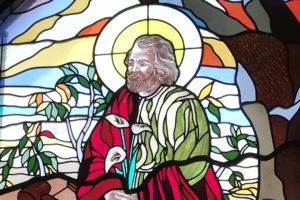
Joseph was a just man who followed the stirrings of the Holy Spirit, listened to his dreams, and put love above the law and into action.
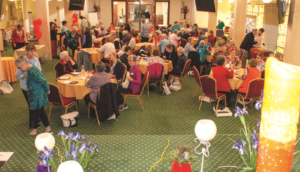 In October 2019, sixty-three Sisters of Saint Joseph gathered at St Joseph’s Reflective Centre at Baulkham Hills, as our General Chapter, to discern our vision and actions for the next six years. The word ‘listen’ became significant – we not only listened to one another and the voices of our sisters around the Congregation, we also listened to the voices of those who, with Josephite heart, share in our vision for living the Gospel, and the deeper concerns of our world and church today. Our current Chapter document begins with an invitation to ‘listen’ – to listen to the call to be audacious Josephite people.
In October 2019, sixty-three Sisters of Saint Joseph gathered at St Joseph’s Reflective Centre at Baulkham Hills, as our General Chapter, to discern our vision and actions for the next six years. The word ‘listen’ became significant – we not only listened to one another and the voices of our sisters around the Congregation, we also listened to the voices of those who, with Josephite heart, share in our vision for living the Gospel, and the deeper concerns of our world and church today. Our current Chapter document begins with an invitation to ‘listen’ – to listen to the call to be audacious Josephite people.
Joseph is a wonderful inspiration in the field of listening. Joseph has nothing to say. He just listens to the voice of God in his dreams and quietly does what the Spirit stirs in his heart. Our Chapter vision not only calls us to listen. It calls us to action – to be there in the critical issues facing our world, to participate in a relational way in God’s mission and to honour the gift of Religious life in our church.
On this feast we ask Joseph to teach us to listen, to stop talking and to start listening so that we may hear the knock of those ‘seeking room at the inn’ and to respond with compassionate hearts as he did.
I have been pondering what it must have been like for Joseph as he listened to the words of Simeon when he took Mary and the child Jesus to the temple for the ritual of purification. This child would be a light to the Gentiles and would bring glory to God’s people Israel. What joy and amazement must have stirred in Joseph’s heart? Simeon then follows with the words to Mary ‘and a sword will pierce your heart’ (Luke 2:29-35). Imagine the sharp pain that Joseph must have felt with these words. Joseph teaches us in this gospel story how to be present in the joys and sorrows of life.
Our world is currently going through similar realities which pull at our heart strings – the spread of the coronavirus, recovery from bushfires and drought here in Australia, refugees fleeing war ravished countries, the increase of domestic violence to name just a few. In these critical times Joseph teaches us to how to remain steadfast when life throws up these difficult challenges and to live with integrity as he did, trusting in his faithful God. He also guides us in knowing how to sustain hope and to rejoice in the gifts of each day just as he delighted in seeing Jesus grow in wisdom and strength even amidst the challenges.
On this feast of Joseph let us ask for the blessing of strength to be still and listen, the fortitude to be patient amidst the many trials and tribulations that confront us and the courage to say yes to the presence of the Holy Spirit in our lives.
Happy Feast Day.
Sr Monica Cavanagh
Congregational Leader
[1] Stained glass window of Saint Joseph taken at St George Maronite Catholic Church in Thornleigh, New South Wales
Sisters of Saint Joseph Queensland
March 18, 2020For the past seven years the sisters living in Queensland have belonged to the TransPacifico Region of the Congregation.
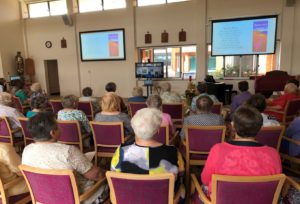
It spanned Queensland, Aotearoa New Zealand, Peru and Brazil. For the past six years Sister Annette Arnold has been the Regional Leader and was supported in Queensland by a local coordinating group of Sisters Mary Sheridan, Sandra Hopkins, Francine Caesar and Angela Carroll.
Sister Monica Cavanagh, the Congregational Leader, and her Team decided to reconfigure the governance and proclaimed the new Queensland Region. Sr Monica was due to fly to Brisbane for the ritual of closure and proclamation of the new Region but was unable to fly due to the COVID19 Virus. The sisters gathered as planned and Sr Monica came in via Skype and all engaged in a very meaningful Ritual. Unfortunately, the sisters in residential care could not attend.
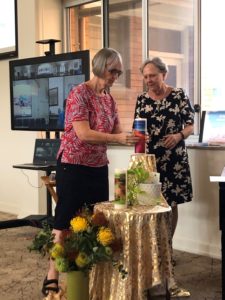
During the Ritual, Sr Monica closed the TransPacifico Region and proclaimed the new Queensland Region. The candle representing the new Queensland Region was lit from that of the former Region. Sr Annette handed the candle to the new Queensland Regional Leader, Sr Lyn Stabler, who takes up office on St Joseph’s Day 19 March. Sr Lyn has been appointed for three years and will be supported in her leadership with two Councillors, Sisters Jenny Scari and Elaine Smith.
While COVID19 is intruding heavily on everyone’s lives and could have negatively impacted this significant moment in the life of the sisters in Queensland, it didn’t. Mary MacKillop was a communicator par excellence, so no doubt she was taking good care of all.
Annette Arnold rsj
You’re invited to watch Sr Monica’s address to the Queensland sisters below:
The First Three Houses of Providence: The Rocks, Sydney, NSW
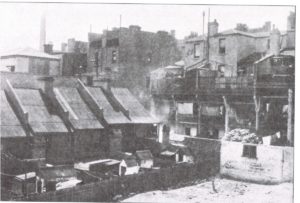 Mary MacKillop and the pioneering Sisters of Saint Joseph of the Sacred Heart in Adelaide, South Australia had begun a House of Providence there in 1868 to minister to homeless women and children, giving them shelter, food and a chance to recover from whatever trauma they had experienced that left them in such desperation.
Mary MacKillop and the pioneering Sisters of Saint Joseph of the Sacred Heart in Adelaide, South Australia had begun a House of Providence there in 1868 to minister to homeless women and children, giving them shelter, food and a chance to recover from whatever trauma they had experienced that left them in such desperation.
In 1880 the notion of a House of Providence was a new concept for the colonial residents of Sydney harbour. The work was totally dependent on the Providence of God to help the poor and destitute. The location around the port of Sydney on the western foreshore was called The Rocks because of the rocky and steep terrain upon which small, poor dwellings clung, offering shelter, small business enterprises and watering holes for thirsty sailors and desperate itinerants.
Fourth House of Providence: 3 Cumberland Street, The Rocks
In May 1881 ‘Cheshunt’, 3 Cumberland Street, The Rocks became the fourth House of Providence of the Sisters of Saint Joseph of the Sacred Heart.
The establishment of ‘Cheshunt’ marked a significant growth point in the work of the Sisters. (Click to view article on the First Three Houses of Providence at The Rocks here).
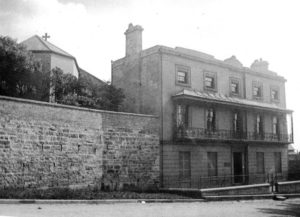
St Patrick’s Day 2020
March 17, 2020My name is Patrick.
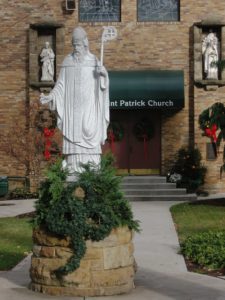
Ireland has many saints, the stories of whom have come down to us from tradition, often wrapped in legend and myth, but Patrick is different; he tells his story himself.
His brief autobiography, written in old age, begins with an introduction: “My name is Patrick” and goes on to recount how at sixteen he was captured, taken hostage and sold to a Druid in the north of Ireland, how he worked there for six years as a herdsman exposed to all weathers and conditions and how he prayed, “up to a hundred times a day” and the same at night. He tells of a dream that prompted him to journey 200 miles to the coast where, miraculously, a ship was waiting, and he found passage back to Britain and his family.
However, it was the results of another ‘vision in the night’ which endeared Patrick to the Irish people to this present day. He tells us,
Many years later having become ordained as priest and bishop, Patrick did arrive back in Ireland. The year was 432. The rest as we say, is history. His teaching and example as he travelled the length and breadth of the country, inspired a faith in the Irish people, the depth of which carried them down the ages through occupation, dispossession of land and culture and the unspeakable horrors of famine and war.
But what do we know of Patrick himself? In his writings we see a man of immense humility, filled with passionate love of God, and the people. We see his respect for the indigenous people in his incorporation of their reverence for the land, waters, seasonal cycles and the heavens, with Christian principles and rituals. His administrative ability enabled him to set up councils and monasteries throughout the country and he showed enormous courage in his denunciation of the British mistreatment of the Irish Christians. And in all of this there is never a doubt as to the source of his strength: A prayer, “The Deer’s Cry”, traditionally attributed to Patrick, endures to this day. (Link to musical version by Shaun Davey on YouTube.)
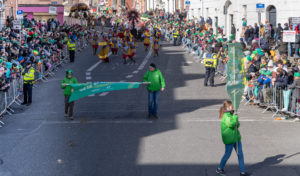
Little wonder then that each year in Ireland, March 17, the date of Patrick’s death, is a day of great celebration. Normal life is suspended while singing and dancing take over the streets. Traditionally families go to Mass in the morning, proudly wearing a sprig of shamrock, and then the party begins. Thousands flock to join the huge Dublin parade with performing artists from all over the world. Many of our New Irish bring their cultures too to the parade as it snakes its way colourfully through the heart of the city, and now, thanks to the Irish diaspora, St. Patrick’s Day is celebrated worldwide. Even our politicians take part in the action, delivering a bowl of shamrock to the White House in honour of America’s welcome of our refugees from oppression, war and famine.
And all because Patrick, trafficked as a young boy to work in a foreign land, found it in his heart to forgive, and in answer to a call, returned to that foreign land to share with the people there a Light infinitely greater than the sun they worshipped and to offer them a freedom beyond anything they had ever known.
We are grateful.
Briege Buckley rsj
Irish Region
The reference quoted is an ancient work written by Saint Patrick himself and the translation from the original Latin is by Padraig McCarthy, 2003, who has given his full permission for its use on a public site.
Images:
Thumbnail: Happy St Patrick’s Day image by Tumisu obtained from Pixabay. Used with permission.
Statue of St Patrick in Pittsburg obtained from Wikimedia Commons. Used with permission.
St Patrick’s Day March, Dublin image obtained from Wikimedia Commons. Used with permission.
Ego to Eco: Part Four
March 13, 2020Father Julian Tenison Woods was a Catholic priest who had made a great contribution to Australian Geology, Botany, Palaeontology and Zoology.
Today the ecology of the Earth is suffering. Pope Francis states that we are in a time where peoples of the world need to have an ‘ecological conversion.’
Although Father Julian had lived in a different time to us, he had recognised the importance of looking after the Earth.
International Women’s Day 2020
March 8, 2020International Women’s Day is dedicated to celebrating women’s achievements in the social, economic, cultural, and political spheres.
Its history dates back to 1909 when 15,000 women protested long work hours, low pay, and the lack of voting rights in New York City.
A detailed history of the development of International Women’s Day, countries in which it is celebrated and how, can be found on many websites. You might find the following sites helpful:
 Throughout time women have struggled to move beyond stereotypes; have challenged societal biases; have called people to broaden their understanding of the nature of “woman”; have endeavoured to highlight their capabilities and therefore their rights. Women’s ongoing struggle for acknowledgement and equality has had and continues to have many different faces. We see this in Malala Yousazai as she stands up and advocates for the rights of girls to gain an education; in U.S. Supreme Court Judge Ruth Bader Ginsburg and her determined quest for acceptance and recognition; in our own Edith Cowan who, in 1921 was the first women to be elected to government; in Mary MacKillop, who, in her own way challenged stereotypes of religious life and worked for the rights of children to be educated. We see a young woman taking a stand on behalf of climate change, and another sailing solo around the world. For some the struggle is to gain the right to work outside of the home. In the developed world, one of the today’s struggles is that of equality between women and men in remuneration for work.
Throughout time women have struggled to move beyond stereotypes; have challenged societal biases; have called people to broaden their understanding of the nature of “woman”; have endeavoured to highlight their capabilities and therefore their rights. Women’s ongoing struggle for acknowledgement and equality has had and continues to have many different faces. We see this in Malala Yousazai as she stands up and advocates for the rights of girls to gain an education; in U.S. Supreme Court Judge Ruth Bader Ginsburg and her determined quest for acceptance and recognition; in our own Edith Cowan who, in 1921 was the first women to be elected to government; in Mary MacKillop, who, in her own way challenged stereotypes of religious life and worked for the rights of children to be educated. We see a young woman taking a stand on behalf of climate change, and another sailing solo around the world. For some the struggle is to gain the right to work outside of the home. In the developed world, one of the today’s struggles is that of equality between women and men in remuneration for work.
No doubt as you read, each of you will call to mind stories of women you know or have known who, in their own ways, have challenged stereotypes, have broken through boundaries that have constrained them and have achieved recognition and equality. These struggles, be they very public or more hidden, have demanded much of each woman and often those with whom they are connected. For these many women, known and unknown, we give thanks for we today are the beneficiaries of their struggles. Never must we take for granted all that has been achieved on behalf of and for women. Walking in the footsteps of these women, each of us has responsibility to continue their work wherever we find ourselves, lest their efforts be in vain.
While this coming celebration on the 8 March is about the achievements of and for women, I believe it is important to pay heed to the words of Gloria Steinem, journalist, feminist and political activist who says “the struggle for women’s equality belongs to all who care about human rights.” The issue then becomes one of human rights, and surely this is what we are about – the rights of each human being. When a person is respected, acknowledged, valued, has a voice and has access to what is needed for their full dignity, they are enabled and empowered. Being thus empowered, each can achieve much for themselves and others. As each one is empowered so too our world becomes more empowered to continue to work for the dignity and rights of all.
International Women’s Day calls us to reflect on dignity, justice, empowerment, equality…
You might like to spend a little time considering the following:
- Whom did Jesus empower?
- Whom did Mary MacKillop empower?
- Whom did/does society/church today empower?
- What works against empowerment?
- Whom do I empower?
- Am I prepared to challenge structure that are oppressive and exclusive?
- Am I prepared to take action on behalf of another as a matter of justice?
- What personal resources might I need to continue to work for the empowerment of others?
working for the rights of women particularly
and those, known and unknown,
who continue to break through boundaries,
challenge perceptions,
and work for equality in our world.
Annie Bond rsj
Image: Group of women standing on rock fragment by Omar Lopez obtained from Unsplash. Used with permission.
A Day in the Life: Living at Mount St, North Sydney
For this month’s ‘Day in the Life,’ Sr Claire Dawson talks about living at Mount St, North Sydney.
In the video below, you’re invited to watch Sr Claire who spoke with Kath Norman (Communications Manager) of her wonderful memories of living at Mount St…
